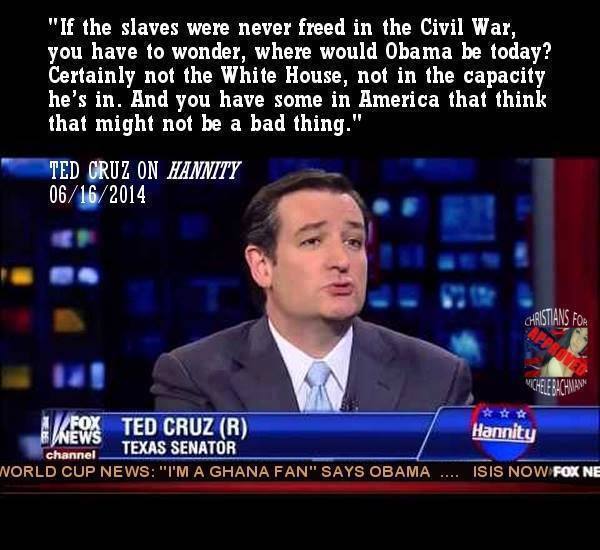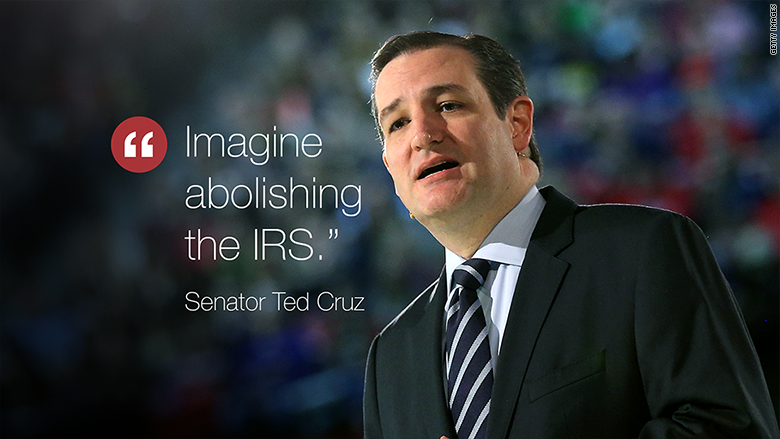
“I think President Obama is the most radical president this nation’s ever seen … And in particular, I think he is a true believer in government control of the economy and of our everyday lives. In my judgment, we are facing what I consider to be the epic battle of our generation, quite literally the battle over whether we remain a free market nation.” ( June 2011)
On those who would give up the fight to defund Obamacare: “Look, we saw in Britain, Neville Chamberlain, who told the British people, ‘Accept the Nazis. Yes, they’ll dominate the continent of Europe, but that’s not our problem. Let’s appease them. Why? Because it can’t be done. We can’t possibly stand against them.’” ( September 2013)
On climate change: “You know, back in the ’70s — I remember the ’70s, we were told there was global cooling. And everyone was told global cooling was a really big problem. … The problem with climate change is there’s never been a day in the history of the world in which the climate is not changing.” ( February 2014)
To a largely Arab Christian audience in Washington, as they booed him offstage for his vocal support of Israel: “I am saddened to see that some here, not everyone, but some here, are so consumed with hate… If you will not stand with Israel and the Jews, then I will not stand with you.” ( September 2014)
On former Sen. Chuck Hagel, during hearings on his nomination to be secretary of defense: “We do not know, for example, if he received compensation for giving paid speeches at extreme or radical groups. … It is at a minimum relevant to know if that $200,000 that he deposited in his bank account came directly from Saudi Arabia, came directly from North Korea.” (February 2013)
Sen. Ted Cruz (R-Tex.) is winning renewed attention from both voters and pundits, many of whom see a candidate who shares a few positions with front-runner Donald Trump but has more experience and expertise in politics.
Cruz and Trump do agree on some issues, particularly immigration. In general, though, Cruz is more conservative than Trump -- and the rest of the Republican field, for that matter.
In a sense, he has become the candidate that many observers expected would present the most serious challenge to the GOP establishment in the presidential primary. He offers the kind of ideological consistency -- with a couple of glaring exceptions -- that many pundits thought disaffected voters would look for in a Republican candidate, until Trump stole the show by combining moderate and extreme opinions.
Here is a look at where Cruz stands on the issues.
Immigration
Immigration has become the dominant issue in the GOP primary so far, and Cruz and Trump see this question the same way. Like Trump, Cruz wants to end birthright citizenship. He would introduce a constitutional amendment denying citizenship to children born to parents who are in the United States illegally.
Cruz would also triple the number of border patrol agents at the Mexican border, quadruple the number of aircraft at their disposal and build more border fencing, according to a plan published by his campaign.
[Fewer immigrants are entering the U.S. illegally, and that’s changed the border security debate]
[Fewer immigrants are entering the U.S. illegally, and that’s changed the border security debate]
Unlike Trump, who has said he would deport the 11 million migrants who are in the country illegally, Cruz has ducked questions on that issue, calling it “a distraction.” But he has made proposals that would make it harder for them to stay in the United States. As president, Cruz would ask Congress to deputize local law enforcement as immigration agents, giving police officers and sheriff's deputies the authority to enforce federal laws against undocumented immigrants.
Cruz, whose father immigrated legally from Cuba in 1957, has also proposed legislation that would exclude most migrants fleeing the civil war in Syria. He'd admit those who are members of persecuted minorities, primarily Christians. "There is no meaningful risk of Christians committing acts of terror," Cruz said last month.

That place was Canada.
Canadian-Born, Cuban-Fathered Ted Cruz Has Stopped Talking "Birther Politics"
Foreign policy
Beyond immigration, though, Cruz and Trump diverge. Cruz advocates a restrained foreign policy, particularly with regard to military intervention in the Middle East.
"If you look at President Barack Obama and Hillary Clinton, and for that matter some of the more aggressive Washington neo-cons, they have consistently misperceived the threat of radical Islamic terrorism and have advocated military adventurism that has had the effect of benefiting radical Islamic terrorists," Cruz recently told Bloomberg.
Trump is far more bellicose.
"I would bomb the s--- out of them," he said last month in Fort Dodge, Iowa. "I would just bomb those suckers. And that's right: I'd blow up the pipes, I'd blow up the refineries. I would blow up every single inch. There would be nothing left."
Cruz's opposition to "adventurism" also contrasts with Sen. Marco Rubio (R-Fla.), another leading contender for the nomination, and most of the rest of the field. That includes Sen. Rand Paul (R-Ky.), who many observers thought would caution against military interventions overseas as did his libertarian father, Ron Paul. The younger Paul, though, has taken a harder line toward Iran.
Surveillance
Cruz also disagrees with much of the Republican field, including Trump and Rubio, on surveillance. Cruz's priority is protecting Americans' privacy from government snooping. He doesn't think the National Security Agency should collect metadata on phone calls and voted to limit the agency's authority in June. Other candidates have criticized him and Paul, who said that legislation didn't go far enough to protect civil liberties and voted against it, for their positions. Jeb Bush, the former governor of Florida, told "Fox and Friends" last week he thought Cruz's vote was misguided.
As for Trump, he has made clear that he is willing to consider extreme measures to monitor Americans and prevent terrorist attacks, includingregistering all Muslims in a national database.
Taxation
Cruz has proposed a kind of national sales tax similar to those levied in European countries. He would replace the corporate tax with a 19 percent value-added tax or VAT, which businesses at different links in the supply chain pay on their purchases. To cover the total costs of paying the tax, firms would have to charge consumers more for their products.Under Cruz's plan, all individual taxpayers would pay a flat 10 percent rate on all their income, which would constitute a massive reduction in taxes for the wealthy. Less affluent households would also pay less in taxes, but the VAT would increase the cost of living for them, especially for poor and middle-class families who spend a larger share of their income on goods and services.
Many conservative economists favor a VAT because, unlike an income tax or a tax on capital gains, it does not penalize people for working more or for saving money. The tax encourages effort, investment and frugality. That said, other conservative thinkers oppose the VAT because its complexity prevents voters from understanding how much they are paying in taxes.
Discretionary spending
According to the Tax Foundation, a nonpartisan think tank, Cruz's tax plan would cost the government $768 billion in revenue over 10 years, money that would be added to the national debt -- unless, as president, Cruz found a way to reduce government spending.
To that end, Cruz proposed eliminating five major federal agencies and making "$500 billion in specific cuts" to the budget. Yet while a document published by his campaign offers a detailed critique of a number of departments and programs the senator sees as wasteful, it includes no specific cuts, nor an accounting of how Cruz would arrive at a reduction of $500 billion in spending.
The five large agencies he would eliminate are the Departments of Education, Commerce, Energy, Housing and Urban Development, and the Internal Revenue Service. Since it is also unclear whether the functions of these departments would be transferred to other agencies or whether they would cease entirely, it is difficult to say what Cruz's plans for the budget would mean for ordinary people.
Entitlements
The other major component of federal spending is the money spent on Social Security, Medicare, and entitlements. Cruz has praised President George W. Bush's plan to partially privatize Social Security, allowing younger workers to pay less in taxes and instead invest the money in accounts under their control. He would not alter Social Security for current retirees. Trump, by contrast,opposes changes to Social Security.
It may be worth noting, as does Vox's Matthew Yglesias, that things would become substantially more expensive for many current retirees under Cruz's tax plan. Retirees would not benefit from his flat 10 percent rate on individual income, since they have little income anyway. At the same time, they would pay substantially more for daily necessities because of the value-added tax.
Monetary policy
Finally, a crucial question for the next president will be choosing the right people for the Federal Reserve. While presidents do not control the central bank directly, they appoint the experts who make decisions about interest rates and inflation.
It is difficult to know what Cruz thinks about these issues, since he has made apparently contradictory statements about them. In general, Cruz favors a return to the gold standard. As Greg Ip explains in the Wall Street Journal, central banks manage crises by reducing the price of currency with low interest rates, and basing the dollar on the price of gold would substantially limit the ability of the Federal Reserve to respond to a catastrophe.
Cruz’s operatives are quietly reaching out to Rand Paul’s early supporters and endorsers, making the case that the Texas senator is their best bet if they want a Republican nominee who is friendly to libertarians.
Recently, though, Cruz has also said he believes the Federal Reserve did not do enough to stimulate the economy during the recent financial crisis. Had the country been on the gold standard at the time, the Federal Reserve would have been able to do even less. As the Federal Reserve reduced interest rates, speculators could have demanded gold from the central bank in exchange for cash as a hedge against the inflation in prices it was trying to produce, counteracting policymakers' attempts to jolt the stalling economy back into motion.

Pandering to idiots?
Or pimping a demented idea because his supporters are demented enough buy in?
Read more from Wonkblog:

Max Ehrenfreund writes for Wonkblog and compiles Wonkbook, a daily policy newsletter. You can subscribe here. Before joining The Washington Post, Ehrenfreund wrote for the Washington Monthly and The Sacramento Bee.
No comments:
Post a Comment